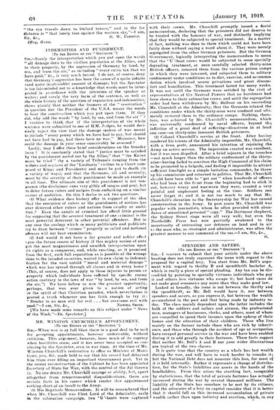INDEMNITIES AND PUNISHMENT. lTo TIM EDITOR or TUC " SPUTTRIOR."1
SIII,—Surely the interpretation which you put upon the words "all damage dote to the civilian population of the Allies, and to their property, by the aggression of Germany by land, by sea, and from the air," as including "every extra tax that we hare paid," Le., is very much forced. I do not, of course, deny that Germany's aggression has been the cause of a quite infinite rand quite incalculable) amount of damage; but the Spectator is too fair-minded not to acknowledge that words must be inter- preted in accordance with the intention of the speaker or writer; and surely the rery form of the sentence, as well as the whole history of the question of reparation and indemnities, chows plainly that neither the framers of the reservation" in question nor the President of the U.S.A. meant the words to bear the construction which you put upon them. If they did, why add the words " by land, by sea, end from the air " I venture to think that if the interpretation of the whole sentence were submitted to one of H.M. Jtidges, he would deci- sively reject the view that the damage spoken of was meant to include "every penny which we have had to pay, but should net have had to pay, had there been no war." Moreover, how could the damage in your sense conceivably be assessed ?
Lastly-, may I offer these brief considerations on the broader issue ? It is constantly stated that " justice most be satisfied by the punishment meted out by the Allies," that " the Kaiser must be tried" (by a variety of Tribunals ranging from the widows and orphans of the 'Lusitania ' victims to a Court com- posed of Kings and Presidents) and must be put to sleuth (in a variety of ways), and that the Germans, all and severally, must by the severity of their punishment be made an example to all time. The ultimate aim of this punishment is not ven- geance (the disclaimer runs very glibly off tongue and pen), but to deter future rulers and nations from embarking on a similar ismer of ambition. On this I desire to ask two questions. '
(1) What evidence does history offer in support of the idea that the execution of rulers or the punishment of nations has ever deterred other rulers and nations from cruelty or ambi- tion ? Even the annals of criminal law afford little ground for supposing that the severest treatment of one criminal is the most powerful deterrent to other potential offenders. But in any ease the analogy which so many politicians and publicists try to draw between "crimes " properly so called and national offences will not bear examination.
(2) And would it not have a far greater and nobler effect upon the future course of history if this mighty nation of ours put the most magnanimous and unselfish interpretation upon its rights as a conqueror, and, while exacting, as it promised from the first, such full reparation as is possible of the wrongs stone to the invaded countries, waived its own claim to indemni- fication for the vast untold "moral and material damage" which war has spread through all classes and in every home ? (This, of course, does not apply to those injuries to person or property which individuals have suffered by specific enemy action contrary to the laws of war "by land, by sea, and from the air.") We have before us now the greatest opportunity, perhaps, that was ever given to a nation of acting in the spirit of that Christian paradox, which nevertheless is proved a truth whenever one has faith enough to try it: " Render to no man evil for evil ... but overcome evil with - (We have made some remarks on this subject nutter " News of the Week."—En. Spectator.]


































 Previous page
Previous page